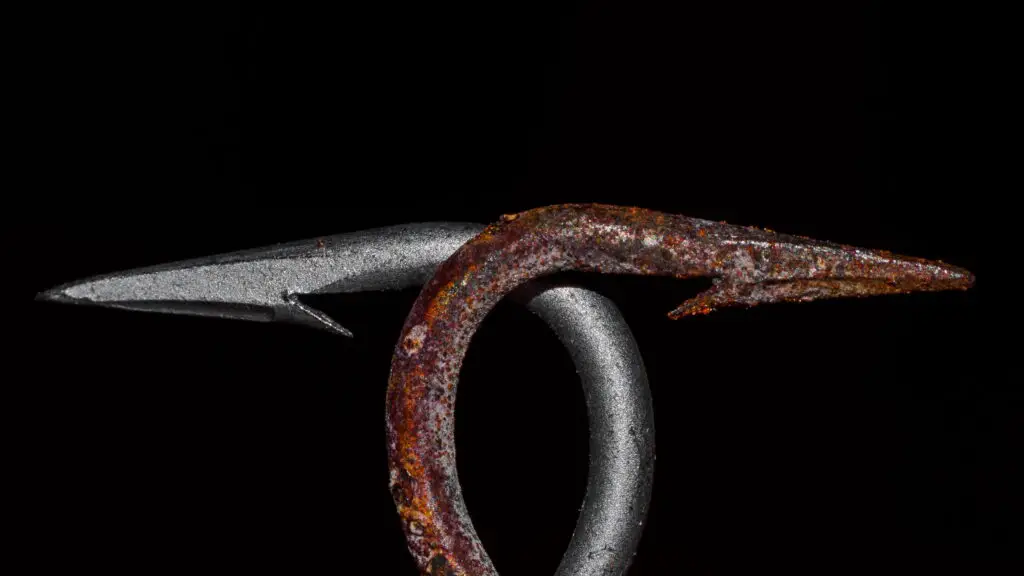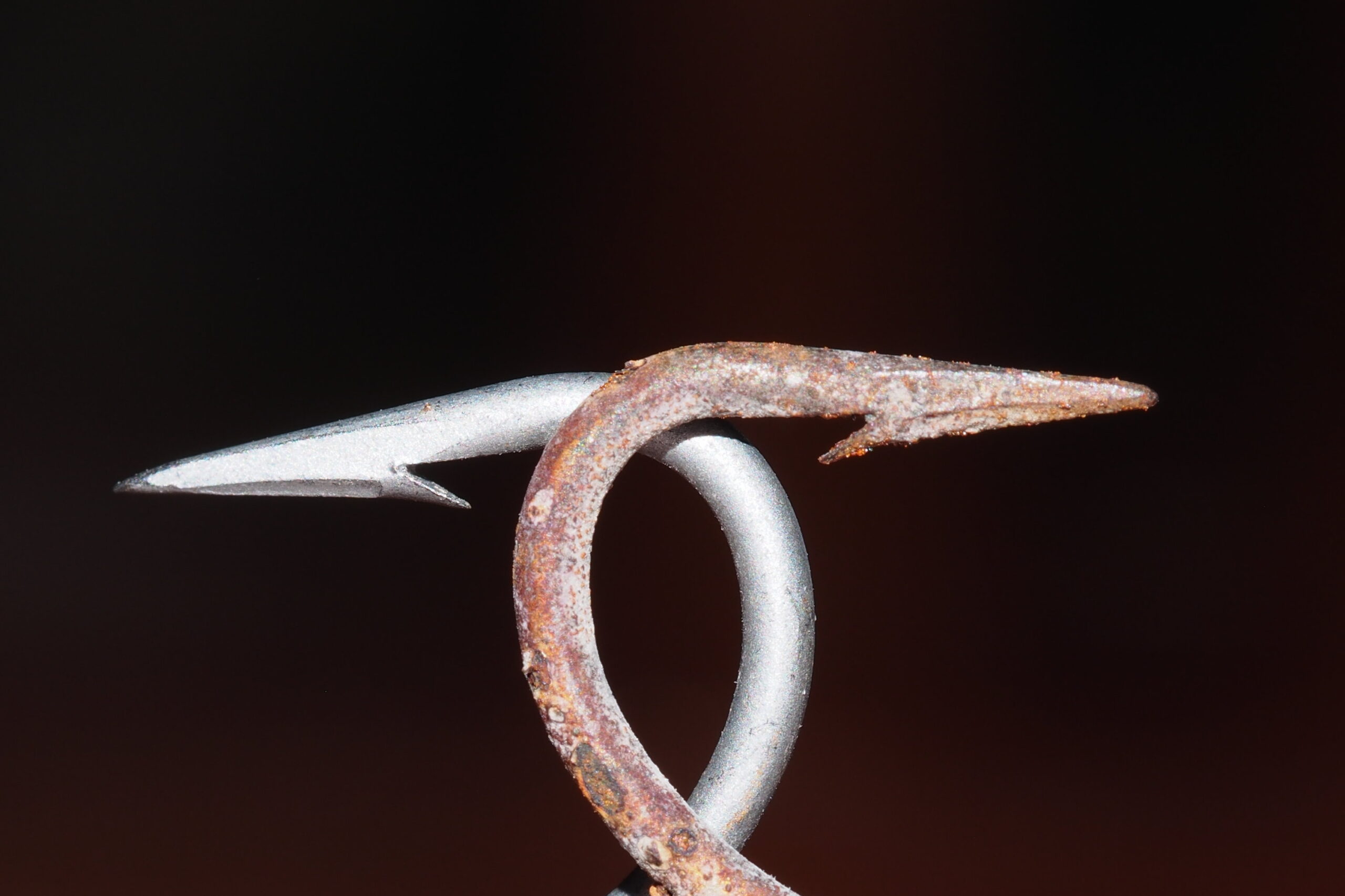Let’s discuss hooks, sharpness, and rust. When is the right time to replace a rusty hook, or give it a shapen?
I know some fishermen who will only fish razor sharp, pristine hooks. Some even ‘sharpen’ the hooks between fish to make sure the hook is perfectly sharp.
On the other hand, there are fishermen who are much more laid back or frugal, they will even fish rusty hooks that feel dull to touch.
I will share my thoughts, I belong in the second group, I do not believe hooks need to be razor sharp to catch fish, and a little surface rust is not going to cause a hook to break.
Reasons not to fish a rusty hook?
There are plenty of good reasons why it might not be a good idea to fish rusty hooks. I will share them below
Rust weakens and blunts hooks
Rust occurs when the metal in the fish hook starts to corrode due to oxidation. This weakens the hook structurally making it more likely to bend or break.
With that said a few spots of surface rust will not have a noticeable impact on durability, but given enough time hooks do become brittle enough to snap with bare hands.
Rusty hooks also can not maintain the same point sharpness as new hooks, the reason is simple. Rust is very weak and the corroded material will flake and break off damaging the point.
Rust is more likely to spread tetanus
This is usually not a big issue, but worth keeping in mind.
Rust does not cause tetanus, but the uneven rough surface of a rusty hook is more likely to spread tetanus (and any pathogen). I suspect most fishermen will hook themselves sooner or later, I have lost count of the number of hooks I have had to remove from my body.
Tetanus is the main bacterial infection spread from wounds. If you are not worried about tetanus, just let me say it can cause spasms so bad that they can fracture bones. So by all accounts, it is an extremely unpleasant and painful disease and one I have no desire to risk catching.
Yes, up-to-date vaccinations can all but prevent infections, but many adults have allowed their vaccinations to lapse which is probably not a good idea considering how common puncture injuries are when fishing.
Can fish catch tetanus?
Some people are worried that fish might catch tetanus if they catch them with rusty hooks.
There is not a lot of published information on whether fish can catch tetanus or not, but it is generally accepted that all animals are susceptible to infection, although certain animals are more susceptible than others.
There is also evidence that at low water temperatures poikilothermic (cold blooded) animals which include fish are resistant to tetanus toxins when their body is below <18c (64f), but become more susceptible when exposed to high temperatures >27c (80f) (1).
I can not say for certain, but because trout live in cold water, it seems likely to have very high resistance to the toxins produced by tetanus infections.
In other clinical trials, it has been found that even minute amounts of tetanus toxin can kill goldfish (1). There is also no shortage of anecdotal experiences shared online with Koicarp showing symptoms comparable to lockjaw (Tetanus)
With the above said, I feel it is important to note that tetanus is not the only disease that can infect a wound, and rusty hooks, because of their rough surface simply carry more bacteria than a smooth hook.

Reasons to fish rusty hooks
So if rust is of no benefit to fishing hooks, why do some fishermen, myself included still fish with rusty hooks?
Will, the main reason is that we are either too lazy or too frugal to replace them. The way I see it if I have already spent good money on a hook, and if it is still strong enough and reasonably sharp why throw it in the bin? It will still catch fish.
I also tend to believe the need for razor sharp hooks is bit overstated. In my experience, very sharp hooks can at times ‘puncture’ into very bony parts of a fish, such as the top of the mouth. In some areas, the hook is really lightly attached, by the thinnest layer of skin, meaning it is very easy for the fish to throw the hook because it is so poorly attached.
On the other hand, a somewhat blunt hook, will only pierce into a fish when it makes a very solid connection, such as in the jaw or the edge of the mouth. A hook set there no matter how sharp or blunt a hook was is going to be very solid and extremely difficult for the fish to throw.
I do not believe blunt hooks, hook more fish, but they are less likely to superficially hook fish. Now, all things being equal, a sharp hook probably will bring more fish to the net, but in my opinion, the difference is not enough to really worry about.
Hook design matters: Circle vs J
The importance of sharpness also matters greatly when comparing different designs of hooks. The main difference between circle and J hooks.
Circle hooks are designed to plant themselves in the corner of a fish’s mouth, while J hooks are designed to pierce almost anywhere.
For this reason, J hooks work best when they are extremely sharp, they need to be sharp enough to push through bony parts of a fish’s mouth.
Circle hooks are designed not to hook themselves until they reach the circle of the fish’s mouth, the point then secures itself in the flesh between the soft tissue between the jaw and skull. If a circle hook is extremely sharp, it increases the risk of it catching somewhere must less secure than the jaw.
So, J hooks need to be extremely sharp, because they are designed to penetrate anywhere. Circle hooks can get away with being less sharp because they are designed to penetrate after the point has rolled itself into the fish’s jaw.
I will, and do fish rusty circle hooks. I usually throw away rusty J hooks.
How to prevent fishing hooks from going rusty?
I know, it is easier said than done. But, the best thing to do is to prevent your fishing tackle from getting rusty in the first place.
If you are anything like me, you will buy fishing hooks and tackle in bulk. When buying in bulk, do not bring the large package of 50 hooks out on the water and risk getting them wet, but transfer what you need into a smaller container and keep the rest in storage.
I do a lot of kayak fishing, and kayak fishing is often very wet. So I have developed the habit of only bringing the gear I absolutely need. I own several hundred lures, but I will only bring a dozen or so out on the water with me. The rest can stay safe and dry in my shed.
I also like to keep used tackle separate from any new tackle. So after using, I try to remember to put all my used tackle into a separate container, with the intention of rinsing and drying the tackle off once I get home.
I then spray the hooks and lures with some cheap vegetable oil, this forms an airproof layer that further prevents rust from developing. It is also possible to use WD40 or any other rust inhibitor.
If you use tackle anything near saltwater, make sure to rinse and dry thoroughly before putting them into storage. Otherwise, rust is nearly guaranteed. Freshwater angling is a lot more forgiven but with enough abuse, rust can still develop.
How to remove rust from fishing hooks?
I personally just give the hooks a quick rub down with some sandpaper to remove the worst of the corrosion, then coat them lightly with oil. If the point is feeling extra blunt, give it a few swipes with a hook sharpening diamond just to recover the edge. I always plan to use refurbished hooks first, because the sandpaper often damages the coating increasing the risk of future rust.
Some people like to use a combination of vinegar and baking soda to eat away the rust. Yes, it works and does a great job. The problem is, that once the rust is gone, the solution will start eating away at the metal. While stainless steel is pretty much resistant to acid, more reactive metals such as chrome can get degraded quite quickly. So, use vinegar sparingly, and rinse well when trying to restore tackle.

